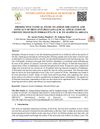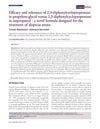 October 2023 in “Benha Journal of Applied Sciences”
October 2023 in “Benha Journal of Applied Sciences” PPAR-γ may be a key target for treating alopecia areata and other skin conditions.
 October 2023 in “Frontiers in medicine”
October 2023 in “Frontiers in medicine” Comprehensive screening for infections is crucial before starting JAK inhibitors in alopecia areata patients.
 September 2023 in “Medical and Clinical Case Reports”
September 2023 in “Medical and Clinical Case Reports” People with Alopecia Areata often have thyroid problems like Hashimoto thyroiditis and hypothyroidism.
 September 2023 in “Curēus”
September 2023 in “Curēus” Alopecia areata may be linked to hearing problems, so patients should monitor their hearing.
 August 2023 in “International journal of research in dermatology”
August 2023 in “International journal of research in dermatology” Janus kinase inhibitors are effective and generally safe for treating hair loss in adults with alopecia areata.
 August 2023 in “Clinical and experimental dermatology and therapies”
August 2023 in “Clinical and experimental dermatology and therapies” Dupilumab may help hair regrowth in some patients with severe atopic dermatitis, but results vary.
 August 2023 in “Sabuncuoglu Serefeddin Health Sciences”
August 2023 in “Sabuncuoglu Serefeddin Health Sciences” CT60 polymorphism might increase the risk of Alopecia Areata.
 July 2023 in “The Egyptian Journal of Hospital Medicine ”
July 2023 in “The Egyptian Journal of Hospital Medicine ” The conclusion is that emotional support and a variety of treatments are important for alopecia areata, but more research is needed.
 June 2023 in “Dermatology and therapy”
June 2023 in “Dermatology and therapy” Doctors in the Middle East need better treatments and more knowledge about new therapies for hair loss condition Alopecia Areata.
 April 2023 in “Medizinische Genetik”
April 2023 in “Medizinische Genetik” New research has found 14 genes linked to the risk of developing alopecia areata, improving understanding and treatment options.

Liquid nitrogen cryotherapy worked well for many patients with stubborn alopecia areata.
 January 2023 in “Malaysian Journal of Medical Research”
January 2023 in “Malaysian Journal of Medical Research” Early and proper treatment is crucial for children with allergic conjunctivitis to avoid complications.
 January 2023 in “International Journal of Zoological Investigations”
January 2023 in “International Journal of Zoological Investigations” Certain genetic variations in IL-16 may increase the risk of alopecia areata.
 November 2022 in “SAS journal of medicine”
November 2022 in “SAS journal of medicine” There's no link between low iron levels and the hair loss condition, alopecia areata.

Combining epinephrine with a steroid may help regrow hair in severe alopecia areata cases.
 July 2022 in “Singapore Medical Journal”
July 2022 in “Singapore Medical Journal” Most children with alopecia areata improved with treatment, but those with more hair loss had worse outcomes.
 April 2022 in “Research Square (Research Square)”
April 2022 in “Research Square (Research Square)” The combination of laser and topical steroids is more effective for treating alopecia areata than topical steroids alone.
 February 2022 in “Global academic journal of medical sciences”
February 2022 in “Global academic journal of medical sciences” People with alopecia areata have much lower Vitamin-D levels than healthy individuals.
 July 2021 in “International journal of homoeopathic sciences”
July 2021 in “International journal of homoeopathic sciences” Homeopathic treatment can help manage alopecia areata in children.
 April 2021 in “Sohag Medical Journal”
April 2021 in “Sohag Medical Journal” Alopecia areata is an autoimmune condition causing hair loss, linked to genetic factors and immune system issues, with no cure yet.

Topical calcipotriol successfully treated hair loss in three patients with Alopecia Totalis.
 July 2019 in “The European research journal”
July 2019 in “The European research journal” RDW can be a useful marker for inflammation in alopecia areata patients.
 March 2019 in “Applied sciences”
March 2019 in “Applied sciences” Laser therapy might help regrow hair in alopecia totalis better than steroids alone.
 August 2018 in “Journal of The American Academy of Dermatology”
August 2018 in “Journal of The American Academy of Dermatology” Children with alopecia areata should only get thyroid screening if they have Down syndrome, a family history of thyroid disease, atopy, or signs of thyroid problems.
 July 2018 in “International journal of research - granthaalayah”
July 2018 in “International journal of research - granthaalayah” Croton tiglium application significantly improved hair regrowth in alopecia areata patients.
 April 2018 in “bioRxiv (Cold Spring Harbor Laboratory)”
April 2018 in “bioRxiv (Cold Spring Harbor Laboratory)” A gene variant causes patched hair loss in mice, similar to alopecia areata in humans.
 June 2017 in “Journal of clinical and investigative dermatology”
June 2017 in “Journal of clinical and investigative dermatology” Red blood cell folate levels are reliable indicators of long-term folate status in alopecia areata patients.
 May 2017 in “Journal of The American Academy of Dermatology”
May 2017 in “Journal of The American Academy of Dermatology” Certain factors like patchy hair loss at the back of the head, being female, and younger age at diagnosis can lead to a worse outcome for alopecia areata.
 January 2017 in “Nasza Dermatologia Online”
January 2017 in “Nasza Dermatologia Online” Both treatments helped hair regrowth in alopecia areata, with isopropanol being better tolerated.
 January 2016 in “Journal of The Korean Medical Association”
January 2016 in “Journal of The Korean Medical Association” The document says how to diagnose and treat hair loss from alopecia areata, but there's no cure and treatments vary.






























